The advanced ICM Calculator can be used to determine ICM and chip chop distributions for deals in tournaments and simplifies poker tournament deal negotiations.
Just enter stack sizes and prize money for up to 9 players and hit “Calculate ICM Distribution”. A more detailed description of the ICM Calculator is below.
Raw Output and ICM Results
How to use the advanced ICM Calculator
Enter the Data
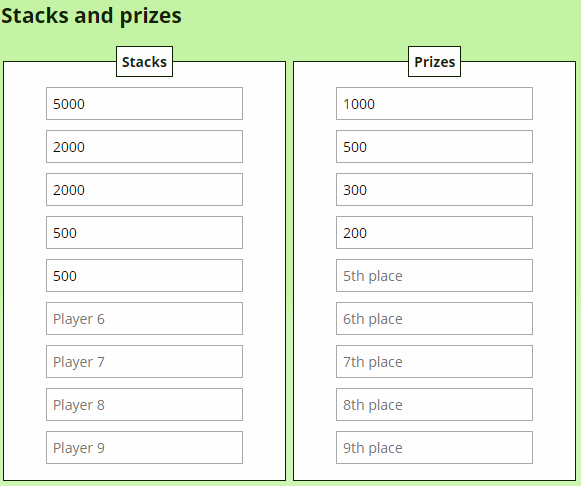
We’ll just focus on the Standard Input mode for now:
- Stack Sizes: Enter the stack sizes for each player (leave fields blank if you’re running a calculation for less than 9 players).
- Prizes: Enter the prizes for each position. Please only use decimals. Prizes will be sorted in descending order when calculating.
- Money set aside: If you want to you can set aside some money that will be played for after the deal. This amount must be smaller than the difference between 1st and 2nd place.
Once you’re done, hit the button “Calculate ICM Distribution” and the Poker Deal Calculator does its magic.
Prize Money Distribution
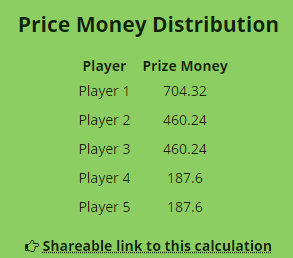
The ICM calculator shows how much money each player receives according to the Independent Chip Model (or ICM).
It’s also possible to show how much a chip chop deal pays out or even how much a mix of both deals pays out. This can be done via fine-tuning. More about fine-tuning is below.
Below the table is a link (Shareable link to this calculation) that can be used to share this calculation. Any possible fine-tuning will be shared as well.
ICM Finish Distribution
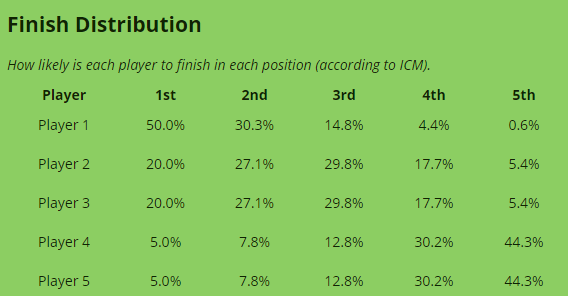
The ICM calculator also provides a detailed table that shows how likely it is, that each player finishes in any position. This calculation is based purely on ICM and stack sizes.
Advanced ICM Calculator Options
There are some options that make this ICM Deal Calculator stand out a bit. Let’s go through them.
Advanced Input
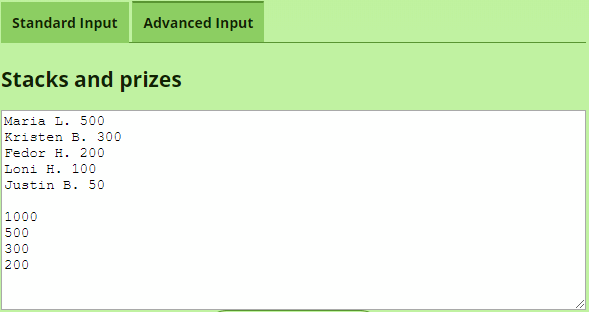
The Advanced Input doesn’t look very advanced, it’s just a text box. But copy-pasting chip counts and prizes from other sources is sometimes easier than manually entering all the information.
- Stack Sizes: The advanced input scans the first lines until the first blank line for stack sizes. It also supports player names. Just use the format “name stack-size”. If you don’t use a name, the calculator will assign the usual “Player x” names.
- Prizes: After the first blank line the advanced input scans for prizes until the next blank line.
- Options: Below that are options – all of which can be set when fine-tuning (see below). Meaning: don’t adjust these options here.
Fine Tuning
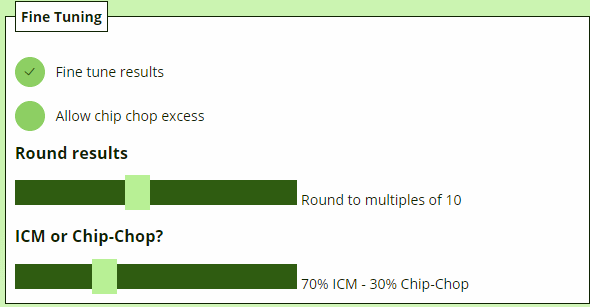
When you tick the checkbox “Fine tune results” you get a set of options to adjust the calculation results. Those are the options:
- Allow chip chop excess: When calculating chip chop deals (see below) there can be rare occurrences where the deal allots more money to the first place than the payouts would. This happens when there is a single huge chip leader. The default option for this calculator is to not allow such a deal. This calculator redistributes any excess allotments proportionally between the other players. If the checkbox is ticked, deals that allow more than first-place money for any player are possible.
- Round results: You can round the results to the nearest multiple of 1, 5, 10, 50, 100, 500 or 1,000. If the sum of the rounded payouts doesn’t equal the sum of prizes, the rounding error will be added or deducted to or from the player where the error has the most negligible impact.
- ICM or Chip-Chop: By default, the calculator provides a pure ICM deal. But it’s also possible to calculate a chip-chop deal (just move the slider to the far right). It is also possible to calculate a weighted average of both deals. Since ICM deals usually favor short stacks and chip chop deals favor big stacks, sometimes it might be a good idea, to mix both deals. But in general chip chop deals are a rather bad idea for almost all players involved.
Fine-tuning the individual payouts
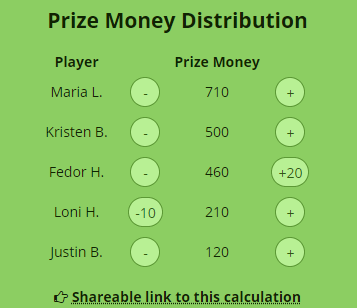
When fine-tuning is enabled you’ll see pluses and minuses pop up in the prize money distribution table. With those buttons, you can manually adjust the payouts for each player.
Clicking plus or minus adjusts the payout for the player by (very roughly) 1 percent. In return, the payout for each other player is adjusted accordingly, so that the sum of the payouts always stays the same.
You can use this option when one player wants at least so and so much when negotiating a deal. When negotiating a deal online you use the shareable link option to send other players a link to the specific adjustment.
Questions, remarks, suggestions, bugs? Please leave a comment below!
